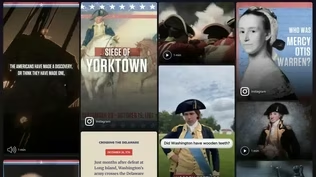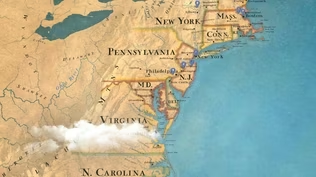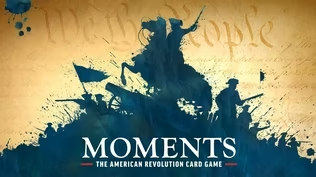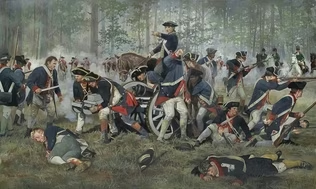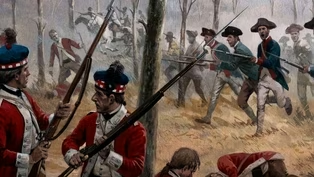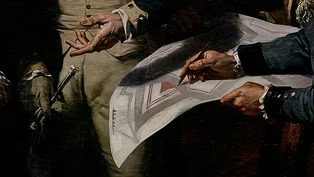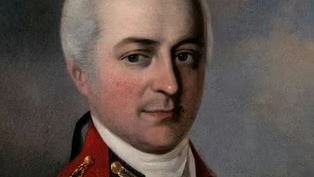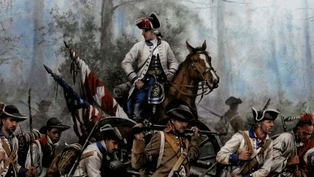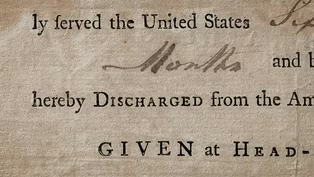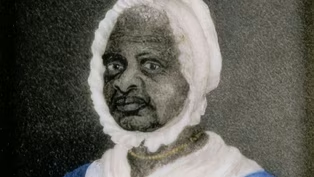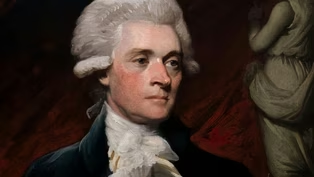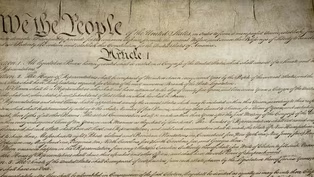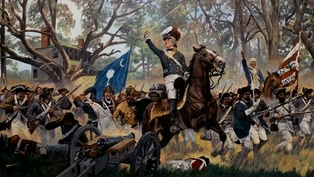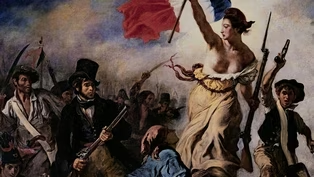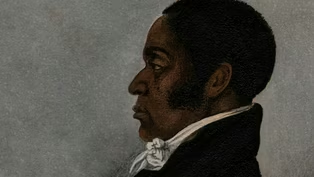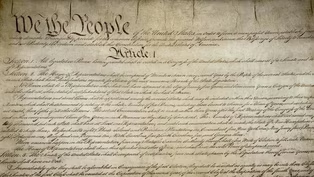
The Constitution & The Formation of A More Perfect Union
Clip: Episode 6 | 7m 17sVideo has Closed Captions
The American Revolution is over, and delegates convene to create a new system of government.
The American Revolution has ended, but the newly United States teeters on the brink of fracturing. Delegates, nearly half of whom own slaves, meet in Philadelphia to draft a new constitution. They create a system of government intended to preserve freedom and liberty, and prevent demagogues from plunging the nation into tyranny. The document is sent to the states to ratify.
Problems playing video? | Closed Captioning Feedback
Problems playing video? | Closed Captioning Feedback
Episodes presented in 4K UHD on supported devices. Corporate funding for THE AMERICAN REVOLUTION was provided by Bank of America. Major funding was provided by The Better Angels Society and...

The Constitution & The Formation of A More Perfect Union
Clip: Episode 6 | 7m 17sVideo has Closed Captions
The American Revolution has ended, but the newly United States teeters on the brink of fracturing. Delegates, nearly half of whom own slaves, meet in Philadelphia to draft a new constitution. They create a system of government intended to preserve freedom and liberty, and prevent demagogues from plunging the nation into tyranny. The document is sent to the states to ratify.
Problems playing video? | Closed Captioning Feedback
How to Watch The American Revolution
The American Revolution is available to stream on pbs.org and the free PBS App, available on iPhone, Apple TV, Android TV, Android smartphones, Amazon Fire TV, Amazon Fire Tablet, Roku, Samsung Smart TV, and Vizio.
Buy Now
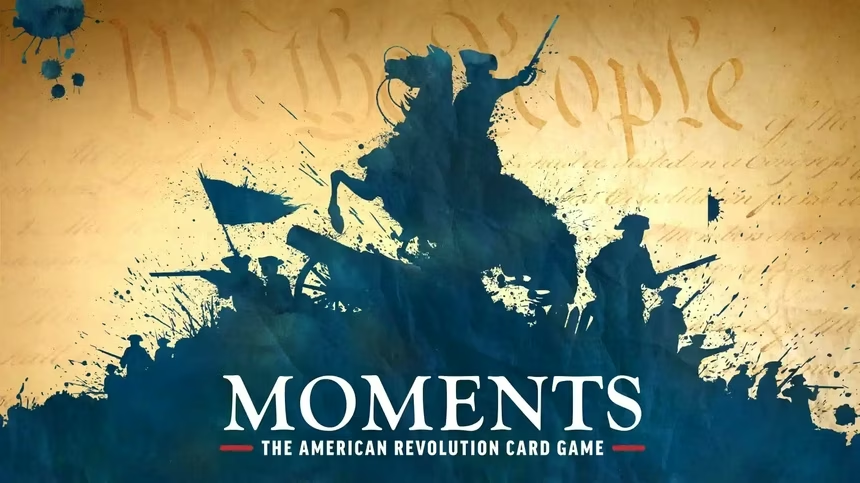
MOMENTS: The Revolutionary War Card Game
Use your knowledge of Revolutionary-era moments to build a timeline of real historical events.Providing Support for PBS.org
Learn Moreabout PBS online sponsorship♪ Voice: These are the times that tried men's souls, and they are over, and the greatest and completest Revolution the world ever knew gloriously and happily accomplished.
As United States, we are equal to the importance of the title, but otherwise we are not.
Our union is the most sacred thing and that which every man should be most proud and tender of.
Our great title is Americans.
Thomas Paine.
[Drum roll] Narrator: The war had brought the states together, but peace soon threatened to tear them apart.
Small states continued to fear large ones.
Northern and Southern states jockeyed for dominance and quarreled over borders.
Vermonters had already declared themselves a separate republic.
North Carolina's Overmountain settlers were seeking to secede and form their own state called Franklin.
[Gunfire] Elsewhere, farmers turned to violence to protest state taxes they considered unreasonable.
In Massachusetts, protest became insurrection, Shays' Rebellion put down only after former comrades in arms fired on each other.
A "cloud of evils," George Washington wrote, "was threatening the tranquility of the Union."
♪ Voice: Our situation is truly delicate and critical.
On the one hand, we stand in need of a strong Federal Government founded on principles that will support the prosperity and union of the states.
On the other, we have struggled for liberty and made lofty sacrifices at her shrine, and there are still many among us who revere her name too much to relinquish the rights of man for the dignity of government.
Mercy Otis Warren.
♪ Narrator: The new Congress, created by the Articles of Confederation, was toothless, saddled with colossal debts, and incapable of collecting taxes with which to pay them off.
Christopher Brown: It's not hard to imagine at all Britain, France, and Spain picking off individual states to create sort of commercial alliances or political alliances and military alliances, as client states, and all kinds of things.
Sounds crazy, but it's no more crazy to have actually created a federal government that would actually work, and famously, a lot of British observers throughout the 1780s-- "Just give them a few years.
It's all gonna fall apart."
Philbrick: One of the lessons Washington learned during the American Revolution is that without a powerful central government, nothing effective could happen.
The frustrations he experienced trying to get these 13 colonies to work in unison and failing every time in the Continental Congress taught him that something had to change.
♪ Narrator: In late May 1787, 55 delegates met in Philadelphia to draw up a constitution.
Nearly half owned slaves.
30 had served in the war.
George Washington lent his prestige by agreeing to preside over the convention.
♪ 4 months later, they had hammered out a 4-page document.
To devise a government that the American people could agree to live under demanded historic compromises-- some creative, some tragic.
♪ The Constitution delineated which powers fell to the central government and which remained with the states, a system of shared sovereignty they called federalism.
The architects of the Constitution divided the federal government into 3 branches-- the legislative, executive, and judicial-- in a delicate balance by which each was meant to check the others to ensure against overreach that could result in tyranny.
They feared that a demagogue might incite citizens into betraying the American experiment.
Alexander Hamilton was concerned that an "unprincipled" man would "mount the hobby horse of popularity" and "throw things into confusion."
"In a government like ours," he would write, no one is "above the law."
[Bell rings] Voice: I wish the Constitution which is offered had been made more perfect, but I sincerely believe it is the best that could be obtained at this time, and as a constitutional door is opened for amendment hereafter, the adoption of it is, in my opinion, desirable.
[Washington] Bailyn: They were trying to create a system in which you could have a sufficiently powerful government that could work properly for its own people and the great powers of the world and still retain the freedoms of the individual, and that is the great issue that runs all the way through the Revolution.
It's a struggle between the possibilities of power and of liberty.
♪ Narrator: In order for the Constitution to take effect, the individual states had to ratify it.
That would foster one of the most extensive public debates in history.
♪ Gordon-Reed: The people who created the American Revolution and created the American nation assumed that Americans would be involved, that they would be active citizens, not subjects.
Being a citizen requires the kind of participation in the democracy that keeps it vibrant.
♪ Narrator: In the end, all 13 states did ratify the Constitution, but before consenting to live under the new federal government, the American people wanted to enshrine the liberties they had won in the Revolution.
The Constitution was almost immediately amended with a Bill of Rights guaranteeing freedom of worship and the separation of church and state, freedom of speech and assembly, the right to keep and bear arms, trial by jury, and a ban on cruel and unusual punishment.
James Madison, who wrote the Bill of Rights, called the Constitution "nothing more than the draft of a plan, "nothing but a dead letter, "until life and validity were breathed into it by the voice of the people."
Video has Closed Captions
Clip: Ep6 | 6m 41s | Daniel Morgan leads the British into a trap, securing a crucial victory for the Patriots. (6m 41s)
The Battle of Yorktown & The End of the American Revolution
Video has Closed Captions
Clip: Ep6 | 10m 44s | Outnumbered and surrounded, General Charles Cornwallis surrenders, ending the American Revolution. (10m 44s)
Benedict Arnold Turns Traitor and Defects to the British
Video has Closed Captions
Clip: Ep6 | 6m 4s | George Washington discovers that Benedict Arnold has abandoned his post and defected to the British. (6m 4s)
Bernardo de Gálvez & His Big Ambitions
Video has Closed Captions
Clip: Ep6 | 3m 20s | When Spain enters the war, the governor of Spanish Louisiana sees his chance to retake West Florida. (3m 20s)
Video has Closed Captions
Clip: Ep6 | 2m 9s | The Continental Army was made up of ordinary Americans, like Joseph Plumb Martin. (2m 9s)
Elizabeth Freeman Successfully Sues for Her Freedom
Video has Closed Captions
Clip: Ep6 | 1m 46s | Mumbet, later known as Elizabeth Freeman, would help bring an end to slavery in Massachusetts. (1m 46s)
Video has Closed Captions
Clip: Ep6 | 3m 8s | The American Revolution is not just the start of a nation, but an event that will change the world. (3m 8s)
Finding America's 'True North'
Video has Closed Captions
Clip: Ep6 | 45s | Writer Rick Atkinson speaks to the legacy of the American Revolution. (45s)
General Nathanael Greene in the South
Video has Closed Captions
Clip: Ep6 | 2m 38s | London’s Southern strategy falls apart as Nathanael Greene takes British outposts one after another. (2m 38s)
George Washington Stops a Mutiny
Video has Closed Captions
Clip: Ep6 | 3m 1s | George Washington takes action when an unsigned manifesto starts circulating among his officers. (3m 1s)
James Forten Becomes a Privateer
Video has Closed Captions
Clip: Ep6 | 2m 36s | James Forten was 14 when he signed onto a privateer to fight for his country. (2m 36s)
Preview: The Most Sacred Thing
Video has Closed Captions
Preview: Ep6 | 30s | Victory at Yorktown secures independence. Americans aspire for a more perfect union. (30s)
Providing Support for PBS.org
Learn Moreabout PBS online sponsorshipSupport for PBS provided by:
Episodes presented in 4K UHD on supported devices. Corporate funding for THE AMERICAN REVOLUTION was provided by Bank of America. Major funding was provided by The Better Angels Society and...

